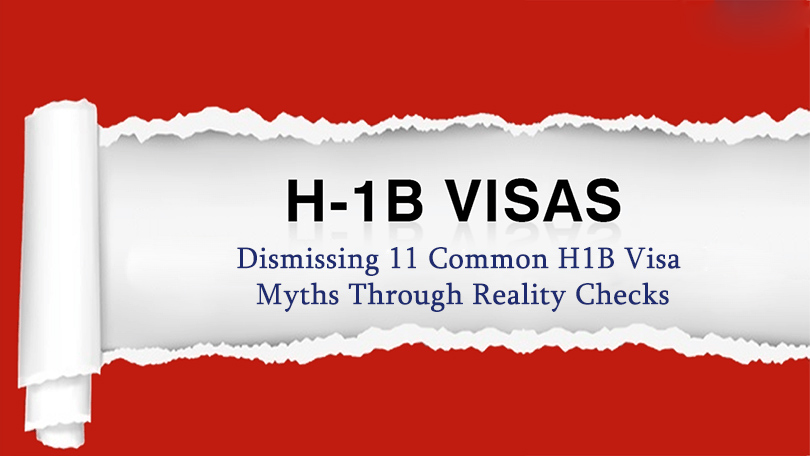Dismissing 11 Common H1B Visa Myths through Reality Checks

Due to its ever-increasing demand and popularity, the H1B visa is among the most debated topics of all times. Misinformation about H1B visa abuse keeps making the rounds. Recently, the Trump Administration has shown major considerations towards the program’s viability. All this and more contribute towards a lot of confusion about the H1B visa process, giving birth to numerous H1B visa myths and misconceptions. If you are among the millions of H1B visa aspirants, it’s time you see the real picture.
Myth 1: H1B Visa Facilitates Cheap Labor
It is often argued that this temporary non-immigrant work visa is an easy way for the U.S. employers to bring in workers that can be paid low wages. The reality, however, was established long ago when a Brookings study revealed how an H1B worker was paid higher ($76,356) than a US-born candidate holding an equivalent degree ($67,310). The program handpicks only the highly-skilled workers who are paid handsome remunerations in return.
Myth 2: Only Large Companies Are H1B Visa Sponsors
The U.S. Citizenship and Immigration Services (USCIS) permit U.S. employers of all sizes to sponsor foreign workers for H1B visa. There is no minimum limit on business revenue or employee strength. Any company with a valid Employer Identification number can participate in the program.
Myth 3: All H1B Visa Petitions Can Be Filed At Any Time
The USCIS opens the window to accept H1B petitions on April 01 every year. The window remains open until the number of petitions reaches the prescribed cap (which is 85,000 at present). Due to its huge demand, the window usually closes in less than a week. If you miss the opportunity this year, you will have to wait for one full year. However, there are some exemptions like H1B transfer petitions and petitions from organizations like universities that can be filed throughout the year.
Myth 4: Premium Processing Improves the Chances of Petition Approval
H1B visa premium processing promises no other benefit other than reducing the time of petition processing to 15 days. This benefit too comes at the cost of $1,410 that must be paid in addition to the usual H1B application cost. It cannot assure improved chances of lottery selection or petition approval.
Myth 5: H1B Visa Is Available for All Types of Jobs
Though H1B visa is the most popular option to live and work in the United States, it is available only for job positions demanding specialized skills. For example, the U.S. employers with jobs in the fields like accounting, engineering, science, banking, architecture, healthcare etc. hire specialized professionals from foreign countries.
Myth 6: H1B Transfer Is Not Possible
Once you are approved for H1B visa, you can change your employer/company any number of times. There is absolutely no limit to the H1B transfers. Going further, H1B transfers are not included in the regular H1B cap. However, your new employer must submit the H1B visa transfer petition to the USCIS.
Myth 7: H1B Transfer Means 6 Years Renewal
H1B visa approval makes you eligible to stay and work in the U.S. for 6 years. It is a common misconception that every time you join a new employer, the 6 years limit would be renewed. The reality is that you can change your job any number of time within the prescribed period. But once it expires, fresh petition for new H1B visa must be filed on your behalf. You may also apply for the permanent residence status within this 6 years period.
Myth 8: Recruitment Procedure Is Mandatory before Filing H1B Petitions
The U.S. employers don’t need to provide any evidence regarding their efforts to hire a U.S.-born employee before hiring a foreign worker. They are independent to file H1B petitions without conducting any recruitment process for the U.S. citizens. However, that would be an exception in case the employer is ‘H1B visa dependent’ which means that a fixed percentage of the company’s employees hold H1B visa.
Myth 9: H1B Visa Cap is Applicable to All Foreign Candidates
The present H1B cap of 85,000 is not applicable to the foreign employees who are already in the U.S. as H1B holders. In addition, those seeking employment with the universities and non-profit organizations are also exempted from it. The same is true about those who pursue an advanced degree program from a U.S. based institute.
Myth 10: Company-wise Limit to H1B Visa Applications
There is absolutely no limit to the number of foreign workers a U.S. company can file a petition for the grant of H1B visa. However, if an employer hires a fixed percentage of H1B employees (for example, if there are 8 H1B employees in a company with up to 25 full-time employees), he or she would be counted among the H1B dependent employers.
Myth11: ‘Change of Status’ Candidates Have Better Chances of H1B Approval
If you are living outside the USA, your chances of H1B approval would be same as those of candidates with H1B visa petitions filed with the intention of change of status (from F1, H4 etc.). The most important things that matter are the educational qualifications, skills and experience.
Don’t let these myths or any other doubts create hurdles in the H1B visa process. It is the right decision to consult an immigration attorney who would help you follow the actual path to success.

